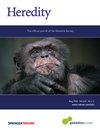温度对耐热和耐寒酵母重组率和减数分裂成功率的影响。
IF 3.9
2区 生物学
Q2 ECOLOGY
引用次数: 0
摘要
减数分裂是所有有性生殖物种形成配子所必需的,并且这一过程在整个生命树中都得到了很好的保存。然而,减数分裂对各种外部因素很敏感,这些因素可以影响染色体配对、重组和生育能力。例如,植物和动物物种之间成功减数分裂的最佳温度是不同的。这表明,减数分裂是温度敏感的,自然选择可能对减数分裂成功的变化起作用,因为生物体适应不同的环境条件。为了了解温度如何改变减数分裂的成功完成,我们利用了两种具有不同温度偏好的出芽酵母:耐热酿酒酵母(Saccharomyces cerevisiae)和耐热酿酒酵母(Saccharomyces uvarum)。我们调查了减数分裂的三个指标:产孢效率,孢子活力和重组率在每个物种的多个菌株。根据我们的预测,完成减数分裂并形成孢子的细胞比例对温度敏感,耐高温酿酒酵母比耐冷酿酒酵母完成减数分裂的温度阈值更高。我们证实了之前的观察结果,即酿酒葡萄球菌的重组率在菌株之间和基因组区域之间存在差异,并增加了新的结果,即uvarum具有相对较高的重组率。我们发现S. cerevisiae和S. uvarum由于温度而具有显著的重组率可塑性,这与动物和植物的研究结果一致。总的来说,这些结果表明,减数分裂热敏性与机体耐热性有关,甚至可能导致种群在热剖面上的分歧而导致暂时的生殖隔离。本文章由计算机程序翻译,如有差异,请以英文原文为准。

Impacts of temperature on recombination rate and meiotic success in thermotolerant and cold-tolerant yeast species
Meiosis is required for the formation of gametes in all sexually reproducing species and the process is well conserved across the tree of life. However, meiosis is sensitive to a variety of external factors, which can impact chromosome pairing, recombination, and fertility. For example, the optimal temperature for successful meiosis varies between species of plants and animals. This suggests that meiosis is temperature sensitive, and that natural selection may act on variation in meiotic success as organisms adapt to different environmental conditions. To understand how temperature alters the successful completion of meiosis, we utilized two species of the budding yeast Saccharomyces with different temperature preferences: thermotolerant Saccharomyces cerevisiae and cold-tolerant Saccharomyces uvarum. We surveyed three metrics of meiosis: sporulation efficiency, spore viability, and recombination rate in multiple strains of each species. As per our predictions, the proportion of cells that complete meiosis and form spores is temperature sensitive, with thermotolerant S. cerevisiae having a higher temperature threshold for completion of meiosis than cold-tolerant S. uvarum. We confirmed previous observations that S. cerevisiae recombination rate varies between strains and across genomic regions, and add new results that S. uvarum has comparably high recombination rates. We find significant recombination rate plasticity due to temperature in S. cerevisiae and S. uvarum, in agreement with studies in animals and plants. Overall, these results suggest that meiotic thermal sensitivity is associated with organismal thermal tolerance and may even result in temporal reproductive isolation as populations diverge in thermal profiles.
求助全文
通过发布文献求助,成功后即可免费获取论文全文。
去求助
来源期刊

Heredity
生物-进化生物学
CiteScore
7.50
自引率
2.60%
发文量
84
审稿时长
4-8 weeks
期刊介绍:
Heredity is the official journal of the Genetics Society. It covers a broad range of topics within the field of genetics and therefore papers must address conceptual or applied issues of interest to the journal''s wide readership
 求助内容:
求助内容: 应助结果提醒方式:
应助结果提醒方式:


